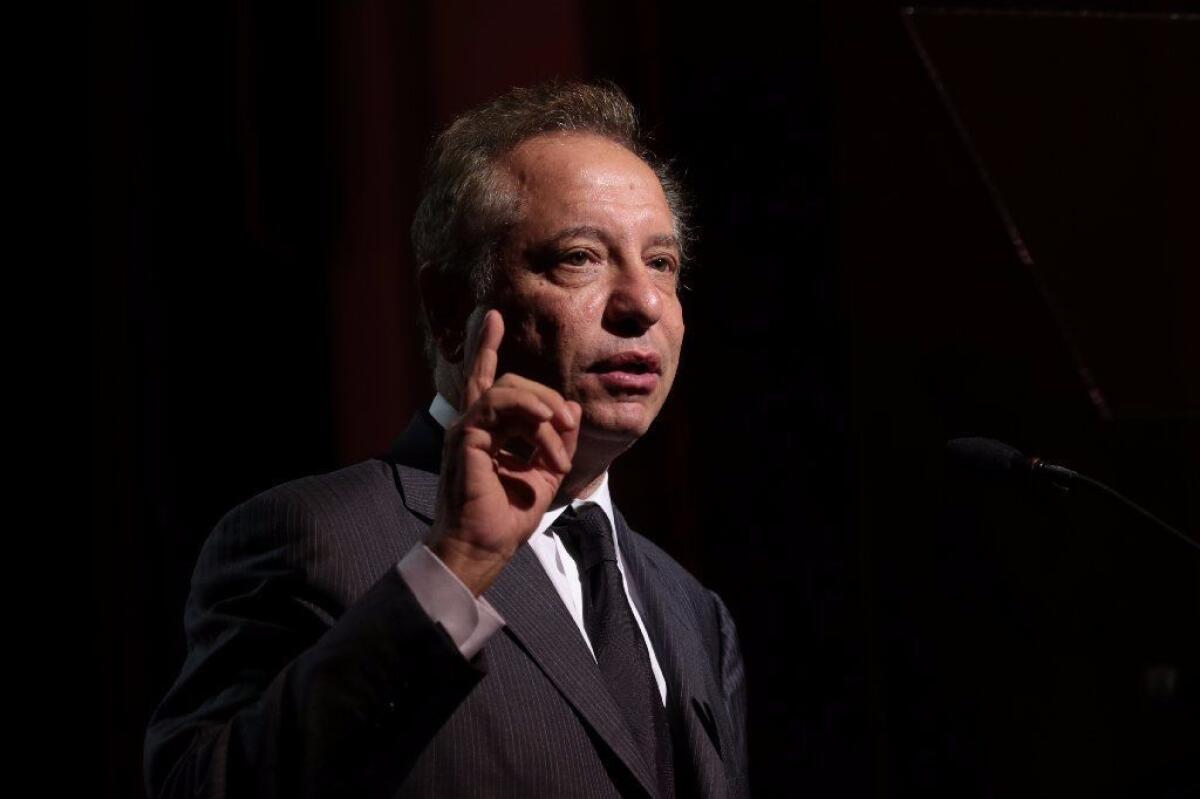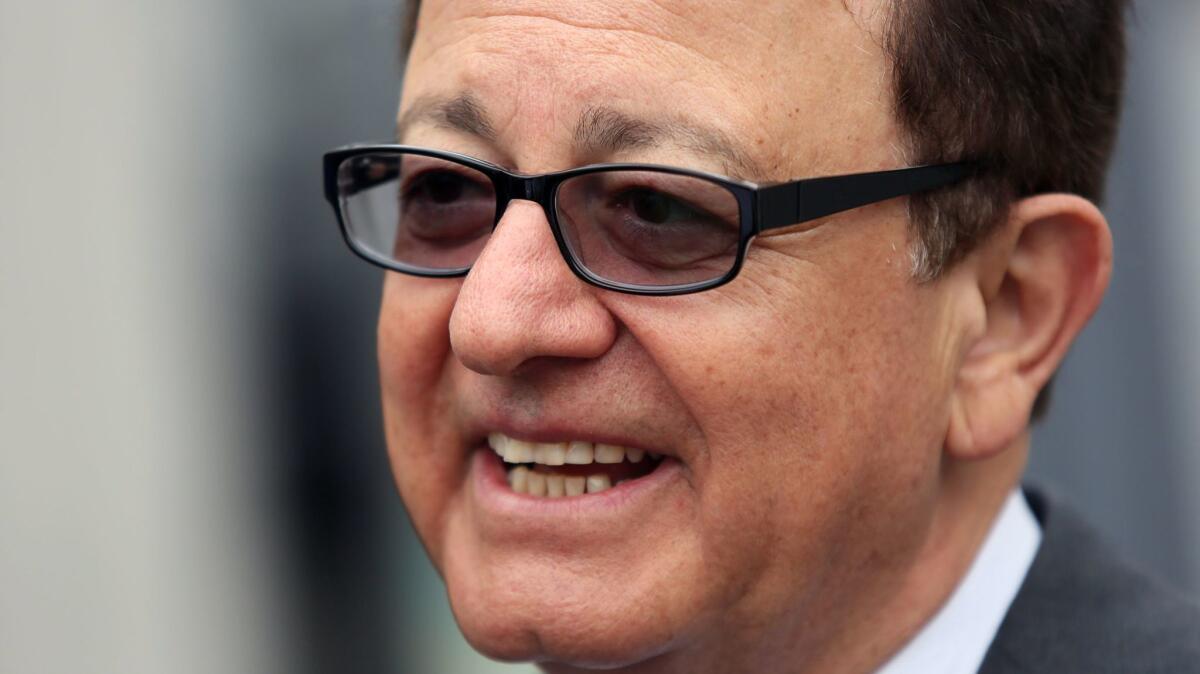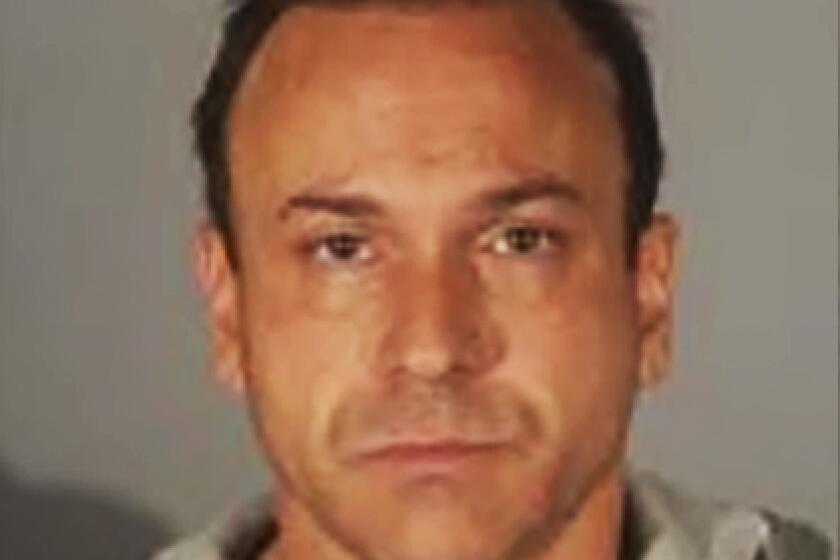Column: USC bosses flunk the leadership test amid shocking allegations about former medical school dean

Former USC med school dean Carmen Puliafito is on leave and no longer seeing patients. (July 18, 2017)
By now you probably know the details.
Dr. Carmen Puliafito, a $1.1-million-a-year professor, doctor, dean and big-bucks rainmaker for the University of Southern California, left plenty of time in his busy schedule for extracurricular activities.
They included drug-fueled parties with a prostitute, convicted criminals and drug addicts. Los Angeles Times sleuths dug up photos of Puliafito’s exploits in hotel rooms, apartments and even the dean’s office at USC, including a shot of him using a butane torch to light a glass pipe while a female companion smoked heroin.
UPDATE: USC moves to fire, ban from campus former medical school dean over ‘egregious behavior’ »
In Monday’s bombshell expose in The Times, reporters Paul Pringle, Harriet Ryan, Adam Elmahrek, Matt Hamilton and Sarah Parvini also reported the details of a 911 call from a Pasadena hotel where a woman had overdosed before being hospitalized. She later told reporters that she and Puliafito had been partying together for two days.
No police report of hotel overdose
But I’m not interested in pounding on Puliafito here. The man appears to have serious problems. He needs help and I hope he gets it.
“Complex addiction doesn’t respect age, income or title,” said a USC-trained physician, who added that he thinks USC will survive this episode, but Puliafito and his family may need help to get through it.
The physician, who didn’t want his name used, also suggested that, given the private school’s endless quest for money, Puliafito’s strengths made him “like a star quarterback … and he was worth keeping in the game if they could keep the incident private, too.”

And that’s the part of the story that interests me most — the actions and non-actions of USC administrators and the Pasadena Police Department.
Let me start with the latter.
On March 4, 2016, paramedics and police responded to the call from the hotel where Puliafito’s companion had passed out. But the responding officer did not file a report on the incident, even though methamphetamine was found in the room. After dogged questioning by my colleague Paul Pringle, Pasadena officials said a report should have been filed and the officer had been disciplined.
Does anyone think for a minute that if an average Joe had been in that room, he wouldn’t have been written up, investigated and possibly charged?
Where’s the outrage?
Did someone influential intercede on behalf of Puliafito to protect his reputation and preserve his status as a prodigious USC fundraiser who schmoozed with the likes of billionaire Larry Ellison, Jay Leno, Warren Beatty, Annette Bening, Martin Short and developer Rick Caruso?
“If the allegations are true,” said Caruso, a USC graduate and member of the school’s board of trustees, “I’m very disturbed and condemn the illegal use of drugs, especially by someone who holds the highest level of trust and care.”
But, like I said, I’m less disturbed by what Puliafito might have done, and more disturbed by what his bosses didn’t do.
The Times reported that 10 days after the hotel incident, an anonymous complaint about Puliafito was submitted to two employees in the office of USC President C.L. Max Nikias. A week and a half later, Puliafito resigned as dean. He later told The Times by email that he had voluntarily decided to move on and pursue a job in biotech.
That sounded suspicious, given what The Times knew. But a Nikias staffer told our reporters: “The president will not be speaking to The Times on this matter.”
Maybe that’s because Nikias was too busy planning a celebratory, catered wingding for Puliafito. If you’re poor and have a drug problem, you land on skid row. If you’re rich and connected, it’s cocktails and kudos.
In June of last year, three months after Puliafito’s resignation as dean, he was honored by various USC administrators, including Nikias.
“Today, we have one of the, not just the area’s, but the nation’s preeminent medical schools and medical enterprises — and, in many ways, thanks to the leadership of Carmen,” Nikias gushed.

It’s about more than money
Are money and prestige all that matter?
Did Puliafito’s prolific fundraising and ability to draw top medical talent earn him not just a pass, but a party?
Reporter Pringle sent numerous emails to Nikias and his associates over more than a year, respectfully asking for an interview. He was ignored each time.
Pringle sent Nikias an email with numerous questions about the Pasadena hotel incident and USC’s handling of the Puliafito matter, and requested, yet again, an interview with the president.
No interview was granted. (Nor did I get anywhere Wednesday with my requests for an interview with Nikias and Puliafito).
And here’s a detail that might make any self-respecting Trojan root for UCLA next year:
Despite having resigned as dean, Puliafito remained on the faculty and continued to see patients for more than a year.
Only after the story hit on Monday did USC release a statement saying Puliafito is “currently on leave from his roles at USC, including seeing patients.” And then on Tuesday, Nikias sent a letter to the “USC community” saying “we are working to determine how we can best prevent these kinds of circumstances going forward.”
Shouldn’t that have begun more than a year ago, when The Times first started asking questions?
‘Stunned depression’ at USC
“The mood on campus is one of stunned depression,” a USC physician said in an email to me, asking me not to use his name. “Students are upset that this was allowed to happen at their medical school, while the faculty are flabbergasted as well as embarrassed.” The physician said that in his opinion, Puliafito should have been immediately suspended in March 2016 and an investigation launched.
“By allowing him to continue to practice,” he said, “patients’ health was put at risk.”
That’s consistent with sentiments expressed Wednesday when the dean who replaced Puliafito told a gathering of students that his predecessor’s alleged actions were “horrible and despicable.”
Students at that meeting said university officials should have known more about Puliafito’s behavior. One woman said it “seems shocking that no one has been able to figure anything out.”
“What an embarrassing time to work for USC and Keck School of Medicine,” said a second faculty member I heard from. “To me, it seems like the university needs a complete moral inventory/overhaul.”
At the very least, Nikias needs to break the silence and tell what he knew and when he knew it.
If he refuses, USC would be better off without him.
Get more of Steve Lopez’s work and follow him on Twitter @LATstevelopez
ALSO
Alleged conduct by former USC dean ‘horrible and despicable,’ med school head tells angry students
An overdose, a young companion, drug-fueled parties: The secret life of USC med school dean
Former USC medical school dean no longer seeing patients; Pasadena police discipline officer
More to Read
Sign up for Essential California
The most important California stories and recommendations in your inbox every morning.
You may occasionally receive promotional content from the Los Angeles Times.











